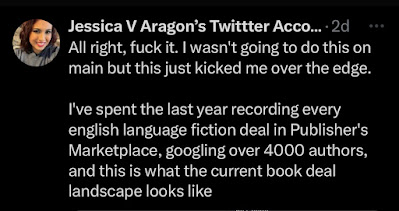Nora Roberts, the prolific novelist, opined that "it’s going to be really hard [for a writer] to get anything done" without the "three D’s: drive, discipline and desire." Per Advice to Writers, Roberts advised:
The most important thing is you can’t write what you wouldn’t read for pleasure. It’s a mistake to analyze the market thinking you can write whatever is hot. You can’t say you’re going to write romance when you don’t even like it. You need to write what you would read if you expect anybody else to read it. And you have to be driven. You have to have the three D’s: drive, discipline and desire. If you’re missing any one of those three, you can have all the talent in the world, but it’s going to be really hard to get anything done.
And Roberts is correct in that if a writer isn't writing about a topic that he or she finds engaging, then it may be difficult to maintain enough drive, discipline and desire to complete a piece.















